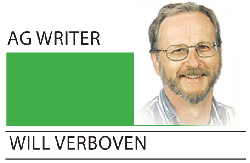In a previous column, I suggested how the Denver plebiscite on closing a slaughterhouse within their city limits would set a serious precedent. The coalition of extremist animal rights and vegan zealots behind the plebiscite presumed that a victory would enable them to take their cause to close down food animal processing almost anywhere. They chose Denver because it is one of the few big cities with a slaughterhouse within their city limits. It’s also a city that is considered progressive, liberal and green – which makes Denver voters easy dupes for animal rights disinformation and propaganda. That voter gullibility and the precedent-setting nature of the referendum saw prominent national livestock organizations donate to the no side, including the National Cattlemens Beef Association and the National Pork Council, in supporting a lamb processing plant.
Perhaps animal agriculture groups and those dependent on that industry learned some lessons from their loss in the California gestation crate plebiscite and their lack of support in stopping the closure of the commercial horse processing business. Those victories emboldened animal rights and vegan zealots in their quest to shut down the entire livestock industry. Picking easy targets for victories has a cumulative effect and drives easily misled folks to donate even more to the devious animal rights lobby industry.
However, a united animal agriculture industry lobby saw the no side accumulate a war chest of $2.7 million to fight the closure vote. That industry effort was rather positive to see, as with other anti-agriculture initiatives, agriculture commodity groups are rarely united, and green and anti-agriculture lobby groups tend to win by default. Perhaps the animal rights groups and their green lobby allies sensed the size of the united animal industry support, as they could only collect $400,000 for their close-the-plant campaign. In the end, the save-the-plant side won by 64%. That’s not bad, considering that most Denver city folks would quite naturally be feeling squeamish about the very existence of a slaughter plant within city limits.
The Denver lamb plant had some positive aspects that helped their side: the plant is locally and employee-owned and not a part of some corporate global entity; the 160 plant workers/owners were predominantly Hispanic; the plant is located in a hard-pressed side of town, so out of sight and out of mind for most Denver voters. Interestingly, the Denver Democratic party and a coalition of unions supported the save-the-plant side in opposition to their traditional allies – environmental and animal rights groups. Union support was limited as the lamb plant, being employee-owned, was not unionized.
One might surmise that what happens in Denver doesn’t much affect animal agriculture and the meat processing up here in the faraway great white north. The fate of the Denver plant does have some impact on the Alberta lamb business. Depending on the year as many as 5,000 feeder lambs from southern Alberta end up in Wyoming and Colorado feedlots that then supply those fattened lambs to the Denver plant. Of course, the folks that had the most to gain from the closure of the Denver lamb plant were importers of Australian and New Zealand lamb into the USA. They already dominate the US market (as they do in Canada), and closing a domestic plant that supplies 20% of the US market would have opened up new markets.
The precedent-setting tactic used by animal rights groups to chisel away at animal agriculture also lives in Canada. There is a bill (C-355) before parliament supported by Liberal/NDP MPs that would terminate the shipping of live horses for feeding and slaughter to Japan. It’s not based on facts and science but on emotion and political expediency, as it is specific to only one animal species destined for a single use – human consumption. The Conservative and Bloc Quebecois opposition have clearly identified the factual flaws of the Bill and have rightly noted that it will be precedent-setting.
Soon, other legislation will be forthcoming that would place further onerous restrictions on the animal agriculture industry. The closure of the Fort MacLeod horse processing plant is surely the next target of the anti-food animal activists who have duped the Liberal/NDP government into supporting the Bill. If that happens, new targets will be the lamb plant in Innisfail, bison plants, and the Red Deer pork plant – death by a hundred cuts. The Canadian animal agriculture industry must lobby against the precedent-setting devious Bill C-355 and not just wait for a change in government.
Will Verboven is an ag opinion writer.









